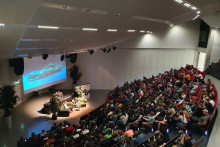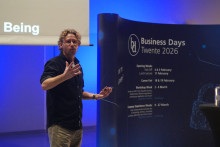Nyck de Vries started karting at the age of four. After a successful career in karting and a transition to car racing, he became world champion in Formula E, a single-seater motorsport championship for electric cars. But how did he become a world champion and what are his views on current Formula E technology? To answer these and other questions, De Vries was a guest at the Formula E Fair at the UT.
Career
When asked how he got into racing, Nyck de Vries jokingly answers that he never had a choice. His family, especially his father, was very enthusiastic about racing, which is why his father strongly influenced him to engage in racing as a hobby. 'When I was very young, my father bought me a go-kart and motivated me to start racing,’ explains De Vries. He also describes that for a long time he viewed racing as a fun activity without feeling any pressure, but as he got older, that changed. ‘When I turned thirteen, the sport became very competitive because I started competing in races all over Europe.’
Since he spent so much time racing, the then 13-year-old Nyck de Vries missed many days of school, which meant he could not miss any more school days or he would get in trouble with his school. ‘To enable me to race, my father was creative, and to get around the Dutch school law, we moved from the Netherlands to Italy.’ The move from the Netherlands to Italy was a big change in his life, allowing him to focus more on racing as he was now no longer tied to a Dutch school. De Vries was prepared to sacrifice a lot for racing, such as his friendships in the Netherlands, because 'at that point, my life already revolved around racing'.
A big step in De Vries' career was the switch from karting to car racing. He made this change at the age of 17. He described that the transition time from karting to car racing was too short for him. 'My body developed relatively late, so it didn't cope well with the stress of racing, because I was 17 but had the body of a 14-year-old.’ This meant that De Vries had less control over the car in the races, which was ultimately the reason why De Vries struggled when he started car racing.
Formula 1, 2 and E
Not only Formula E but also Formula 1 and Formula 2 were topics discussed in the lecture. An audience member asked Nyck de Vries if he thought Formula E would lead to the disappearance of Formula 1 and Formula 2, to which he replied: 'To be honest, I don't think Formula 1 or Formula 2 will disappear, and I don't think Formula E will displace Formula 1 either, because Formula 1 has attracted a lot of attention in recent years, especially in the media.’ Even though De Vries does not believe that Formula 1 or Formula 2 will disappear, he stresses that policies regarding its technology will change in the years to come. ‘I believe that in the next ten years there will be some regulations for Formula 1 and Formula 2 technology to make the cars more sustainable.’
Nyck De Vries also made some predictions for Formula E technology. ‘The technology we are developing in Formula E is becoming more and more competitive with Formula 1 and Formula 2 technology’. He emphasises that Formula E serves an important purpose in addition to entertainment. ‘When it comes to sustainability, change does not happen overnight, but it starts with awareness of sustainable and clean energy. This awareness is promoted by Formula E.’







